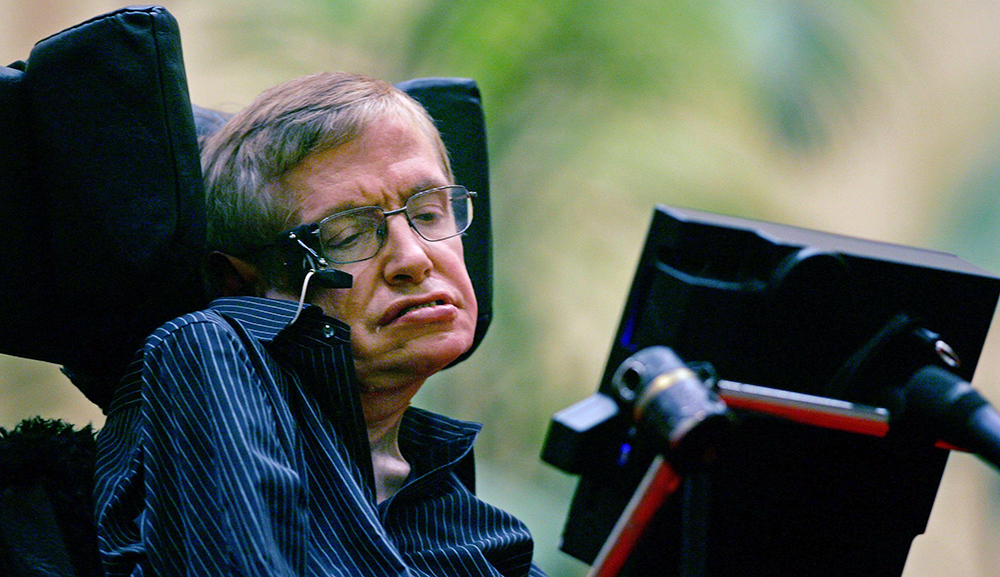Early Life:
Stephen William Hawking was born on 8 January 1942 in Oxford, England. He enjoyed his childhood in St. Alban’s, London. Stephen wanted to study Mathematics, although his father wanted him to study medicine. Mathematics was not available at his college, so he pursued Physics instead. He completed a first class honors degree in Natural Science at Oxford University.
He was not a sociable person, but that never hindered his progress. He believed that, “In Physics it doesn't matter what school you went to or to whom you are related. It matters what you do.” He wasn’t one of the brightest students. His classwork was very untidy, and his handwriting was the despair of his teachers. But his classmates gave him the nickname Einstein because he was exceptionally phenomenal in Mathematics and Physics.

Inquisitive mind:
Later on, in his teens, he built models of an aeroplane and a boat. He was never good with his hands, but he did this together with his school friends. His aim was to build working models that he could operate and control. He didn't care what they looked like. As per Hawking’ thinking, it was the same drive that led him to invent a series of very complicated games with other school friends. He said that these games, as well as the train, boat, and aeroplane, had resulted from an urge to know how systems work and how they could be controlled. Thereafter, he began studying for his PhD, since then his curiosity was fulfilled by his research into cosmology.
He said:
“If you understand how the universe operates, you can control it, in a way.”
Positivity in life:
At the age of 21, he was diagnosed with Amyotrophic Lateral Sclerosis (ALS or Lou Gehrig's disease). In a very simple sense, the nerves that controlled his muscles were shutting down. Doctors gave him two and a half years to live. He felt it was very unfair. “Why should this happen to me?” At that time, he thought his life was over and that he would never be able to utilize the potential he felt he had. But fifty years later, he was quite satisfied with his life. He was married and had three children. He had been very successful in his scientific career. His disability has not been a serious handicap in his scientific work as a scientist. In fact, in some ways it has been an asset. He has been able to devote himself completely to research. This is partly because scientists, apart from Einstein, are not as widely known as Rock Stars, and partly because he fits the stereotype of a disabled genius.
Work on your strengths:
Being well known and easily recognizable has its pros and cons. The cons are that it can be difficult to do ordinary things such as shopping without being besieged by people wanting autographs and photographs. Pros are that people seem genuinely pleased to see him. Stephen Hawking quotes that “I have had a full and satisfying life.” He believes that, “Disabled people should concentrate on things that their handicap doesn't prevent them from doing and not regret those they can't do.” So, basically, focus on your strengths and ignore your weaknesses. In his case, he has managed to do most of the things he wanted. He has also travelled far and wide.
Life as a teacher:
His illness was devastating news for Hawking and his family. A few events in his life, however, prevented him from becoming completely dependent. The first of these happened while Hawking was still in the hospital. There, he shared a room with a boy suffering from leukemia. He saw the boy’s suffering and inferred that in comparison to what his roommate was going through, his situation seemed more tolerable. He could see that he could still make a difference to this world from the remainder of his life. Not long after he was released from the hospital, Hawking had a dream that he was going to be executed. He said this dream made him realize that there were still certain things he wanted to do within his life time.
In a sense, Hawking' disease helped him become the noted scientist he is today. Before the diagnosis, Hawking had not been attentive on his studies. "I am bored with life before my illness," he had then said. "There did not seem anything worth doing." With the sudden realization that he might not even live long enough to complete his Ph.D., Hawking engrossed himself in his work and research.
Doctors had predicted that Stephen would not survive for more than two to three years. As Hawking's physical condition grew worse his intellectual achievements increased. He wrote down his ideas in, “A Brief History of Time: From the Big Bang to Black Holes”. It sold over a million copies and was listed as leading best-selling nonfiction book.